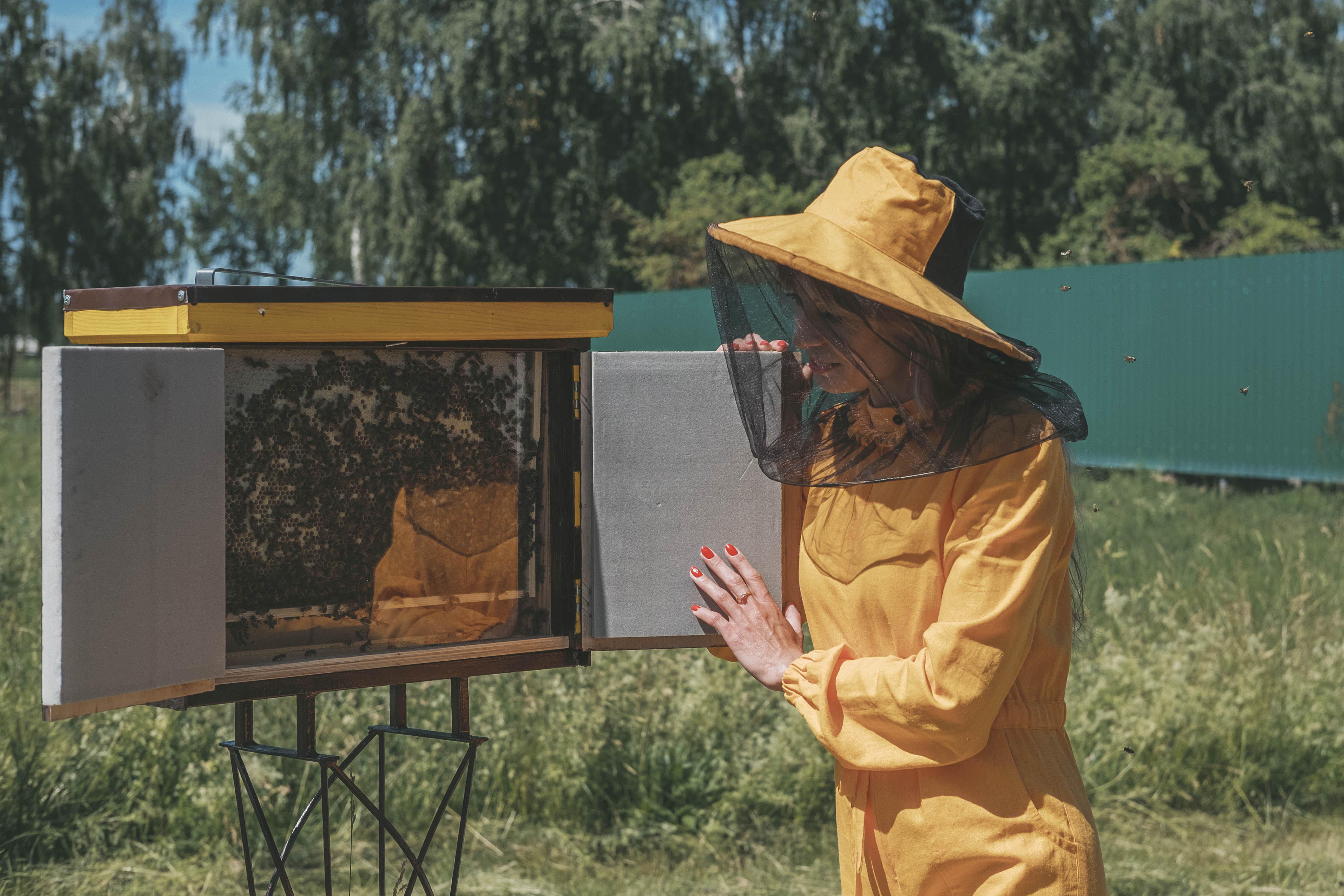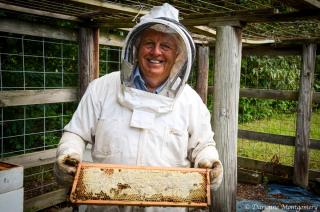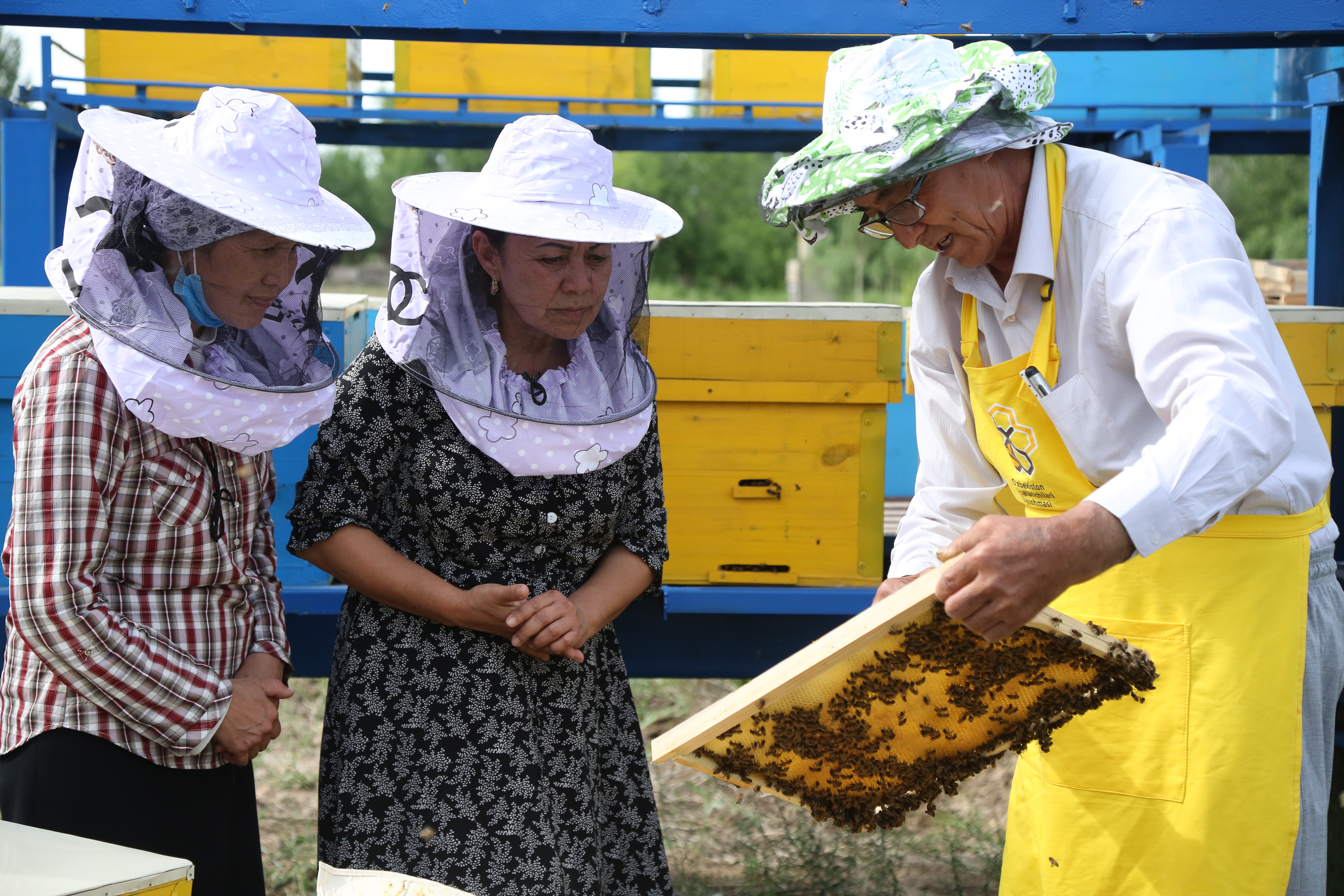Contents
- I. Introduction to Beekeeping and Local Economy
- tags as shown above.
- II. Benefits of Beekeeping for the Local Economy
- 1. Increased agricultural productivity
- 2. Boost in pollination services
- 3. Creation of job opportunities
- 4. Generation of additional income for beekeepers
- III. Beekeeping as a Sustainable Business
I. Introduction to Beekeeping and Local Economy

Beekeeping, also known as apiculture, is the practice of raising and nurturing honey bees for various purposes, such as honey production, pollination services, and wax harvesting. It has become an increasingly popular activity worldwide due to its numerous benefits for both individuals and local economies.
1. Economic Importance of Beekeeping
Beekeeping plays a crucial role in supporting local economies by generating income for beekeepers and contributing to the agricultural sector. The production of honey, beeswax, propolis (bee glue), royal jelly, and other bee-related products creates opportunities for small-scale businesses or artisanal producers.
In addition to direct sales of these products, beekeepers also provide pollination services to farmers. Bees play a vital role in pollinating crops; their activities contribute significantly to increased yields in fruit orchards, vegetable farms, and seed production fields. As a result, farmers are willing to pay beekeepers for placing beehives near their crops during flowering seasons.
2. Job Creation
The expansion of the beekeeping industry leads to job creation at various levels within local communities. Not only do we need skilled beekeepers who manage beehives and maintain healthy colonies but there is also a demand for technicians who build hives or extract honey using specialized equipment.
Moreover, ancillary industries benefit from the growth of this sector—packaging companies that design attractive labels or create customized jars for honey products; transportation companies that deliver beehives or move harvested honey from apiaries to processing facilities; retail stores that sell beekeeping equipment—all contribute towards employment opportunities in different sectors related to apiculture.
3. Environmental Impact
Beekeeping has positive environmental impacts as well. Bees are important pollinators for a wide range of plants, including many fruits, vegetables, and flowering crops. By facilitating pollination, bees support biodiversity and help maintain ecosystems’ balance.
Furthermore, beekeeping practices can contribute to sustainable agricultural practices. Beekeepers often rely on organic or natural methods to keep their colonies healthy, reducing the use of harmful chemicals in agriculture.
4. Tourism and Education
Beekeeping can also attract tourists who are interested in learning about honey production processes or experiencing the rural environment where apiaries are located. This tourism can boost local economies by creating demand for accommodations, restaurants, guided tours, and other related services.
In addition to tourism opportunities, beekeeping provides educational benefits for both children and adults. Schools often incorporate beekeeping programs into their curricula to teach students about environmental conservation and biology. Such initiatives promote awareness of the importance of bees in our ecosystem.
Overall, beekeeping contributes significantly to local economies through economic activities directly related to honey production and pollination services while also creating jobs in different sectors associated with apiculture. It plays a vital role in preserving biodiversity and promoting sustainable agricultural practices while offering educational opportunities for individuals within communities.

Beekeeping plays a crucial role in supporting local economies, providing numerous benefits to both beekeepers and surrounding communities. Here are some key points about how beekeeping positively impacts the local economy:
1. Job Creation
Beekeeping creates employment opportunities within the community. From hive maintenance to honey extraction and packaging, there is a range of tasks that require skilled individuals. Local residents can find meaningful employment in beekeeping operations, contributing to their livelihoods.
2. Honey Production
The production of honey is one of the primary outputs of beekeeping. Local beekeepers can sell their honey products directly to consumers or supply them to local markets and stores. This not only generates income for the beekeeper but also boosts revenue for local businesses.
3. Pollination Services
Bee pollination is essential for agricultural productivity as it helps plants reproduce by transferring pollen from male flowers to female flowers, enabling fruit and seed production. Beekeepers provide pollination services by renting out their hives to farmers during flowering seasons, ensuring higher crop yields and quality produce.
4. Ecotourism
Beekeeping activities can attract tourists who are interested in learning about bees, honey production processes, and sustainable agriculture practices. Bee farms that offer educational tours or workshops create additional revenue streams through ecotourism while promoting environmental awareness among visitors.
5. Value-Added Products
In addition to honey, other value-added products derived from bees such as beeswax candles, propolis-based creams, royal jelly supplements, and pollen extracts contribute significantly to the local economy by diversifying product offerings available for sale.
6. Local Trade and Export
Beekeeping allows local communities to participate in trade activities, selling honey and related products locally or even exporting them to international markets. This opens up opportunities for economic growth, especially in regions known for their unique honey varieties.
7. Environmental Benefits
Beekeeping supports the environment by promoting biodiversity and preserving natural habitats. Bees play a vital role in pollinating wild plants, contributing to ecosystem stability and overall environmental health.
In conclusion, beekeeping has far-reaching impacts on the local economy, providing employment opportunities, fostering agricultural productivity through pollination services, attracting tourists through ecotourism initiatives, creating value-added products for trade and export, and contributing to environmental conservation efforts. It is evident that beekeeping offers a sustainable pathway towards economic development while ensuring the preservation of our natural resources.
Note: The section title should be wrapped with
II. Benefits of Beekeeping for the Local Economy

Beekeeping has numerous benefits for the local economy, contributing to both economic growth and environmental sustainability. Let’s delve into some of the key advantages:
1. Job Creation
Beekeeping provides employment opportunities in various sectors, from honey production to equipment manufacturing and distribution. The industry requires skilled workers who can maintain beehives, extract honey, process wax, package products, market them effectively, and provide essential beekeeping services. By supporting beekeepers and their businesses, local economies can experience a boost in job creation.
2. Increased Crop Yields
The presence of bees significantly enhances pollination rates in agricultural areas surrounding beehives. Bees transfer pollen from male flower parts to female flower parts as they collect nectar or pollen for their hive. This cross-pollination process leads to improved fruit set and higher crop yields for farmers. As a result, beekeepers contribute to increased agricultural productivity within their communities.
3. Honey Production and Sales
Honey is one of nature’s most versatile products with a wide range of uses including culinary applications, health remedies, skincare products, and more. Beekeepers play a vital role in meeting the demand for high-quality honey locally by producing delicious varieties that capture regional flavors unique to their area.
4 . Boosting Tourism
Beekeeping can attract tourists who are fascinated by the world of bees and the natural environment they thrive in. Apiaries often offer guided tours where visitors can learn about beekeeping practices firsthand while enjoying honey tastings or participating in workshops on how to make beeswax candles or lip balms using hive products.
5 . Environmental Stewardship
Beekeepers are essential guardians of biodiversity and environmental sustainability. By cultivating healthy colonies, they contribute to the preservation of native bee populations and other pollinators. These efforts play a crucial role in maintaining the delicate balance of ecosystems, ensuring the survival of plant species that rely on pollination.
1. Increased agricultural productivity

Agriculture plays a vital role in the economy of many countries, providing food, raw materials, and employment opportunities. With the growing global population and increasing demand for agricultural products, it is crucial to find ways to enhance productivity in this sector. In recent years, several strategies have been implemented to boost agricultural productivity and ensure sustainable development.
1. Adoption of Modern Farming Techniques
One key factor contributing to increased agricultural productivity is the adoption of modern farming techniques. Farmers are embracing innovative practices such as precision agriculture, hydroponics, and vertical farming. These technologies enable farmers to optimize resource utilization while minimizing waste and environmental impact.
2. Efficient Water Management
The availability of water is essential for crop growth and productivity. To address water scarcity issues, farmers are implementing efficient irrigation systems like drip irrigation or using sprinklers with sensors that detect soil moisture levels accurately. This allows them to provide crops with optimal amounts of water while reducing wastage.
3. Use of High-Quality Seeds
The use of high-quality seeds has a significant impact on agricultural productivity. Modern seed varieties are bred specifically for improved yield potential, disease resistance, and adaptability to different climatic conditions. By using these seeds, farmers can achieve higher crop yields while maintaining quality standards.
4. Integrated Pest Management
Pests can cause substantial damage to crops if not controlled effectively. Integrated Pest Management (IPM) involves combining various pest control strategies such as biological control methods (using natural predators), cultural practices (crop rotation), and judicious use of pesticides when necessary. By adopting IPM techniques, farmers can minimize crop losses due to pests without harming the environment or human health.
5.Improved Access to Agricultural Information
Access to relevant and timely agricultural information is crucial for farmers to make informed decisions. With the advancement of technology, digital platforms and mobile applications have emerged that provide farmers with real-time weather updates, market prices, and best farming practices. Such information empowers farmers to optimize their productivity by making data-driven decisions.
6. Training and Capacity Building
To enhance agricultural productivity, it is essential to invest in training programs and capacity building initiatives for farmers. By providing them with knowledge on modern farming techniques, good agricultural practices, and financial management skills, they can improve their productivity levels while ensuring sustainable farming methods.
In conclusion, increasing agricultural productivity is vital for meeting the growing global demand for food. Through the adoption of modern farming techniques, efficient water management strategies, use of high-quality seeds, integrated pest management approaches, improved access to agricultural information, and training programs for farmers; we can pave the way towards a more productive and sustainable agriculture sector.
Note: Please ensure you verify the HTML syntax before finalizing your submission
2. Boost in pollination services
One significant benefit of beekeeping is the boost it provides to pollination services. Bees play a crucial role in the pollination of various plants, including fruits, vegetables, and flowers. As they move from flower to flower in search of nectar and pollen, they inadvertently transfer pollen grains from the male part (stamen) to the female part (pistil) of flowers, enabling fertilization and subsequent fruit or seed production.
This natural process ensures genetic diversity within plant populations and contributes to overall ecosystem health. However, with the decline in wild bee populations due to habitat loss and pesticide use, managed honeybee colonies have become increasingly important for crop pollination.
Improved crop yields
Beekeepers strategically place their hives near agricultural fields or orchards that require pollination. The presence of these honeybees significantly increases crop yields as more flowers are effectively pollinated. Studies have shown that fields with managed honeybee colonies can experience yield increases ranging from 20% to as much as 70% compared to areas without adequate bee populations.
Promoting biodiversity
Beekeeping also indirectly contributes to promoting biodiversity by supporting a wide range of plant species. Honeybees are known for their ability to forage over large distances, up to several miles away from their hives. During this foraging activity, they visit different types of flowering plants present in diverse habitats such as meadows, forests, and gardens.
Their interaction with various plant species ensures cross-pollination between plants within these habitats while facilitating gene flow between different populations. This process helps maintain genetic diversity within plant communities and supports healthy ecosystems.
Economic impact
The increased availability of bees for crop pollination has a direct positive impact on local economies. Farmers benefit from improved yields, leading to higher profits and increased agricultural productivity. Furthermore, the abundance of pollinated crops can positively influence food security and availability within local communities.
Beekeeping itself also contributes to the economy by providing opportunities for beekeepers to sell honey, beeswax, pollen, royal jelly, and other hive products. These products are in high demand both locally and globally due to their various uses in food production, cosmetics, medicine, and crafts.
3. Creation of job opportunities
Beekeeping not only offers environmental benefits but also contributes to the local economy by creating job opportunities. As the demand for honey, beeswax, and other bee-related products continues to grow, there is a need for skilled individuals in various aspects of beekeeping.
1. Beekeepers and Honey Producers
The primary role in beekeeping is that of a beekeeper who manages hives, collects honey, and ensures the health and well-being of the bees. Beekeepers are responsible for maintaining apiaries, monitoring hive conditions, and extracting honey using safe practices.
In addition to beekeepers, there are honey producers who process raw honey into various marketable forms such as liquid honey jars or comb honey. These individuals play a crucial role in packaging and distributing high-quality honey products locally or even internationally.
2. Hive Equipment Manufacturers
Beekeeping requires specific equipment like beehives, frames, smokers, protective clothing (such as veils and gloves), extractors etc. The manufacturing sector plays an essential role in producing these necessary items for beekeepers worldwide.
Hive equipment manufacturers create innovative designs that prioritize both functionality and sustainability while meeting the needs of modern-day beekeeping practices.
3. Bee Health Specialists
To ensure healthy colonies and prevent diseases among bees, specialized experts called bee health specialists provide their services to both commercial apiaries as well as small-scale backyard operations.
Bee health specialists conduct regular inspections to identify potential threats or diseases affecting bees. They offer guidance on disease prevention measures or treatments when necessary to maintain strong colonies vital for pollination purposes.
4. Pollination Services Providers
A significant aspect of commercial agriculture relies on pollination services provided by bees. As a result, there is an increasing demand for pollination services providers who transport beehives to farms during flowering seasons.
These service providers ensure that crops receive adequate pollination, which in turn improves crop yield and quality. They play a crucial role in enhancing agricultural productivity and supporting local farmers.
5. Beekeeping Educators
Beekeeping education has become essential due to the expanding interest in sustainable practices and environmental conservation. Beekeeping educators conduct workshops, training programs, and seminars to teach individuals about beekeeping techniques, hive management, and the importance of bees in our ecosystem.
By sharing their knowledge and expertise, these educators contribute towards creating a well-informed community of beekeepers who can effectively manage hives while promoting sustainable practices.
4. Generation of additional income for beekeepers
Beekeeping not only plays a crucial role in preserving the ecosystem but also offers several opportunities for beekeepers to generate additional income. In this section, we will explore some avenues through which beekeepers can diversify their revenue streams and contribute to the local economy.
Selling Honey and Hive Products
The most obvious way for beekeepers to earn extra income is by selling honey and hive products. With the increasing demand for natural, organic honey, beekeepers can tap into local markets or even establish their own online stores to reach a wider customer base. Additionally, they can produce value-added products like beeswax candles, royal jelly, pollen granules, and propolis-based cosmetics.
Pollination Services
Another lucrative opportunity lies in providing pollination services to farmers. Many crops heavily rely on bees for pollination, and beekeepers can lease their hives to farmers during flowering seasons. This mutually beneficial arrangement allows farmers to enhance crop yields while providing an additional income source for beekeepers.
Educational Workshops and Tours
Beekeeping enthusiasts are always eager to learn more about these fascinating creatures. Beekeepers with extensive knowledge can organize educational workshops or offer guided tours of their apiaries where visitors get hands-on experience with bees while gaining valuable insights into sustainable practices. These interactive sessions not only generate income but also create awareness about the importance of bees within the community.
Beeswax Craftsmanship
Beyond honey production, artisans skilled in working with beeswax have a unique opportunity to create handcrafted items such as candles, soaps, balms, and even furniture polish using this versatile material derived from beehives. These artisanal products have gained popularity due to their natural and eco-friendly appeal, providing beekeepers with an alternative revenue stream.
Apiary Rental and Mentorship
Aspiring beekeepers often need guidance when starting their own apiaries. Experienced beekeepers can offer mentorship programs, sharing their expertise and helping newcomers navigate the complexities of beekeeping. Additionally, renting out spare hives or apiaries to beginners allows them to kickstart their journey while generating passive income for the mentors.
Beekeeping is not only a fascinating hobby but also a potential source of income for individuals and communities. The practice involves the management and cultivation of bees, primarily for the production of honey and other bee-related products. However, the benefits extend beyond just sweet treats; beekeeping can contribute significantly to the local economy in numerous ways.
1. Job Creation
Beekeeping requires skilled individuals who understand the intricacies of hive management and honey production. As such, establishing beekeeping operations can create job opportunities within a community. From apiarists responsible for maintaining hives to workers involved in honey extraction and packaging, each stage presents employment prospects.
2. Honey Production
Honey serves as one of nature’s most versatile products. Besides its culinary uses, it has medicinal properties and can be incorporated into various skincare products as well. By engaging in beekeeping activities, local producers can tap into this market demand by selling their own locally sourced honey or using it as an ingredient for value-added products like jams or cosmetics.
3. Pollination Services
Bees play a crucial role in pollinating flowers, fruits, vegetables, and crops essential for our food supply chain. Farmers often rely on commercial pollination services where they rent beehives to ensure better crop yields through increased pollination rates. By offering these services locally instead of outsourcing them from distant providers, beekeepers can contribute directly to agricultural productivity while generating revenue.
4. Eco-Tourism Opportunities
Beekeeping operations attract tourists interested in learning about these industrious insects’ lives while supporting sustainable practices that benefit both bees and local ecosystems. Bee farms equipped with visitor centers or guided tours offer educational experiences and the chance to taste fresh honey straight from the hive. This form of eco-tourism can boost local businesses, including accommodations, restaurants, and souvenir shops.
5. Beeswax Products
Besides honey, beekeepers can collect beeswax as another valuable resource. Beeswax has a wide range of applications in various industries, such as candle making, cosmetics, woodworking, and leatherworking. By utilizing beeswax to create artisanal products or supplying it to other businesses that rely on this natural material, beekeepers can diversify their revenue streams.
Overall, beekeeping presents an opportunity for individuals and communities to not only engage with nature but also stimulate their local economy. From job creation to the production of honey and other bee-related products like beeswax goods or pollination services for farmers – there are ample avenues for economic growth through this sustainable practice. Embracing beekeeping can be a win-win situation where humans benefit from the fruits of industrious bees while simultaneously supporting the local economy’s development.
III. Beekeeping as a Sustainable Business
Beekeeping is not only a fulfilling hobby but also a lucrative business opportunity that can contribute to the local economy. With the growing demand for honey and other bee-related products, starting a beekeeping venture can be a sustainable and profitable endeavor.
The Importance of Beekeeping in Local Economy
Beekeeping plays a vital role in the local economy by providing various economic benefits. Firstly, it creates job opportunities within the community. Beekeepers require assistance in managing hives, processing honey, and maintaining equipment, which generates employment for locals.
In addition to job creation, beekeeping stimulates agricultural productivity through pollination services. Bees are essential pollinators of crops such as fruits, vegetables, nuts, and oilseeds. By keeping bees in close proximity to farms or orchards, farmers can significantly increase their yields and improve crop quality.
Generating Income from Honey Production
Honey production is at the heart of any successful beekeeping business. The delicious golden liquid has numerous health benefits and is widely consumed worldwide. As consumers increasingly prioritize natural products with medicinal properties like honey, there is an ever-growing market demand.
To generate income from honey production sustainably, it’s crucial to establish strong relationships with local retailers or wholesalers who can distribute your product effectively. Additionally, exploring direct-to-consumer sales channels such as farmers’ markets or online platforms can help maximize profits while establishing brand recognition among consumers.
Diversifying Revenue Streams with Value-Added Products
While honey remains the primary revenue driver for most beekeepers, diversifying income streams through value-added products can enhance profitability further. Beeswax candles are one popular option that utilizes leftover beeswax from harvesting honeycomb frames.
Other value-added products include pollen, royal jelly, and propolis, each with unique health benefits and market potential. By expanding the product range to cater to different consumer preferences and needs, beekeepers can tap into niche markets and capitalize on additional revenue opportunities.
Embracing Sustainable Beekeeping Practices
Sustainability is key to the long-term success of any beekeeping business. Embracing sustainable practices not only helps preserve bee populations but also enhances the reputation of your brand as an environmentally responsible enterprise.
This can be achieved by avoiding harmful pesticides in hive management, providing a diverse range of flowering plants for bees’ forage, and ensuring proper hive hygiene. By prioritizing the well-being of your bees and maintaining a healthy ecosystem, you contribute to the preservation of pollinators while cultivating a sustainable business model.
In conclusion, beekeeping offers significant economic opportunities for individuals looking to establish a sustainable business venture. By recognizing its importance in local economies, focusing on honey production while diversifying revenue streams with value-added products, and practicing sustainability throughout operations, beekeepers can flourish both economically and environmentally.
Note: The article may vary in length based on paragraph spacing or other formatting requirements once transferred into HTML format.

Andrew Boyer is an accomplished individual with a deep-rooted passion for bees and their conservation. Born and raised in a small town in Oregon, Andrew developed an early fascination with nature and the environment. He pursued his education at the prestigious University of Oregon, where he obtained a Bachelor’s degree in Environmental Science with a specialization in Entomology. During his time at university, Andrew conducted extensive research on the behavior and ecological impact of bees, earning him recognition from his peers and professors. His dedication to the field led him to internships at local beekeeping associations, where he honed his skills in hive management and honey production. Andrew’s expertise in beekeeping and his commitment to environmental sustainability make him a valuable asset in the conservation of these vital pollinators.
